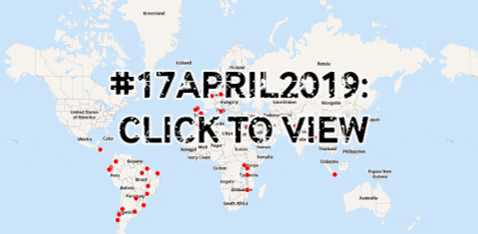“Rights of peasants and Agrarian Reform is what the world needs urgently” | #17April2019 Global Actions
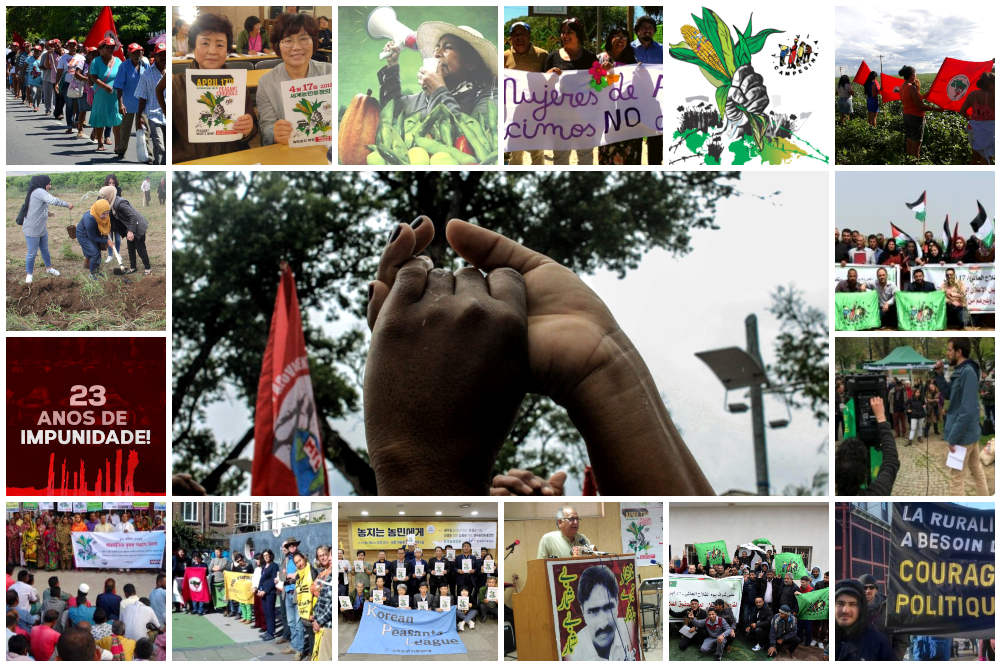
This April, scores of mobilizations and demonstrations around the world called for an urgent implementation of the UN Declaration on the Rights of Peasants by ushering in agrarian reform.
17 April: The International Day of Peasants’ Struggle
On 17 April, 1996 nineteen rural workers and peasants who were part of a large group peacefully protesting and negotiating over a settlement of landless families in Pará, Brazil , were massacred by the military police in a confrontation that was brutal in its intent and scale. A report published on the Eldorado dos Carajás massacre by memorialdademocracia, recalls the incident as follows;
For three months, farmers had been occupying Fazenda Macaxeira, in Curionópolis (PA), under the leadership of the Landless Workers Movement (MST). Faced with the inefficiency of the National Institute of Colonization and Agrarian Reform (Incra), they intended to reach the capital of Pará to charge for the expropriation of the state government. At the roadside encampment, the landless had hoped to get food and transportation to win the remaining 600 kilometers of the journey.
Governor Almir Gabriel (PSDB), Secretary of Security, Paulo Sette Câmara, and the president of the Land Institute of Pará, Ronaldo Barata, articulated a military operation under the pretext of “clearing the highway.”
Nearly 300 policemen armed with shotguns, machine guns, rifles and revolvers invested against the campers, who resisted using sticks and stones. After two hours of confrontation, 19 landless were killed and more than 50 were injured. Dozens of farmers were arrested, beaten and humiliated. No cops died.
17 April was neither the first nor the last time that peasant movements had faced brutal repression from powerful State and Corporate establishments. Across the continents of Asia, Africa, Americas and Europe – rural workers, indigenous peoples and peasant families have been subjected to the most violent forms of exclusion, marginalisation and repression and it continues to this day.
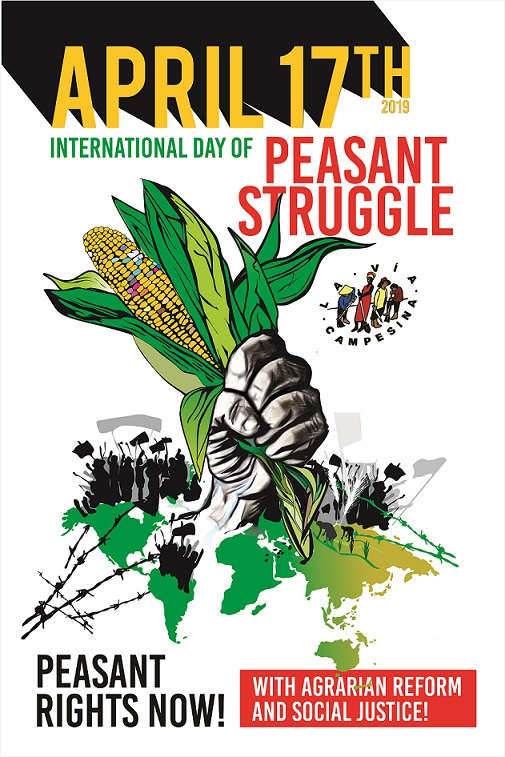
But the Eldorado dos Carajás massacre of 17 April was a tipping point in the peasants struggles led by the global peasant movement La Via Campesina. The peasant movement responded to the brutal repression in Pará, not by marking a moment of silence, but by pledging to fight for people’s freedom and social justice through a lifetime of struggle; thereby keeping the memories of the martyrs in Para alive.
That is how La Via Campesina and its allies came to commemorate 17 April as the International Day of Peasants’ Struggle. This day is a symbol of peasant resistance in the countryside and a day to weave together solidarity between peasant communities around the world.
OVER 45 MOBILISATIONS AROUND THE WORLD: HIGHLIGHTS
This year, the Movement issued a call for solidarity and collective action calling for a Popular Agrarian Reform, an agrarian reform not only for landless peasants, but for all of the working classes and for all of society. Via Campesina firmly believes that agrarian reform can only be won through class struggle and by directly confronting the project of Global Capital, including its profiteers, media outlets, and its national and international agents. The recently adopted UN Declaration on the Rights of Peasants and Other People working in Rural Areas is therefore an important instrument for all the people’s movements in this struggle.
The Declaration, which became a reality in December 2018 was the result of a long and persistent struggle led by the peasants and rural workers, who demanded an international legal tool that would protect their Rights and assist in implementing agrarian reform and social justice in their territories.
A press release issued by the movement on 17 April re-emphasised this point;
“On this International Day of Peasants’ Struggle – with our living memory and rebellion inherited from our 19 landless comrades murdered with impunity in the Eldorado do Carajás Massacre in Brazil, we call upon our members, friends and allies to come together with strong actions worldwide, affirming that the only way to obtain Peasant Rights is with Agrarian Reform and Social Justice.”,
LA VIA CAMPESINA
This call for joint action was well received.
During April 2019, several members of La Via Campesina and its allies comprising NGOs, Universities, students, artists and researchers held various events, workshops and demonstrations to keep alive the memories of people’s struggles. Over 45 events took place across the continents of Asia, Africa, Americas and Europe this year.
Peasants and Workers in Brazil mobilized in large numbers to demand agrarian reform and justice for the families of those killed in Para in 1996. They denounced the impunity enjoyed by the prepatrators of Eldorado dos Carajás massacre till date. This was also the first National Day of Struggles for Agrarian Reform under the right-wing government of Jair Bolsonaro (Social Liberal Party) in Brazil. With the slogan “Peasant rights now, with agrarian reform and social justice,” the peasant organizations held demonstrations and activities across the country to advance agricultural policies.
In Peru, CNA issued a four-point call to bring in equal rights for all citizens including indigenous, Andean and Amazonian peoples who are facing exclusion and eviction from their territories.
In Argentina, peasants and family farmers of Mendoza held a Fair in the city to commemorate the day. At the Fair, they denounced the agricultural crisis, the tariffs, the adjustment policies, and withdrawal of State from public spending. They demanded urgent policies in defense of family and peasant agriculture.
The Caribbean members of La Via Campesina issued a statement calling for the implementation of Peasant Rights as a legal and political tool that will allow the defense of production, the correct use of markets, protection of natural resources, participation and recognition of women and youth in agricultural production.
In Chile, the National Association of Rural and Indigenous Women (ANAMURI) commemorated the International Day of Peasant Struggle with a Forum to discuss the impacts of the Trans-Pacific Partnership (TPP) in the commune of San Nicolás. “We don’t want TPP. Enough of injustice and enough of violence! We want land, we want water and a dignified life!”, they said.
In Guayaquil, Ecuador, the social organizations linked to La Via Campesina held a National Forum titled “Socio-economic impacts of the Agreements with the IMF and the European Union”. During the debate they denounced the massive layoffs of workers, the reduction of workers’ rights, withdrawal of social security and the privatization of public companies.
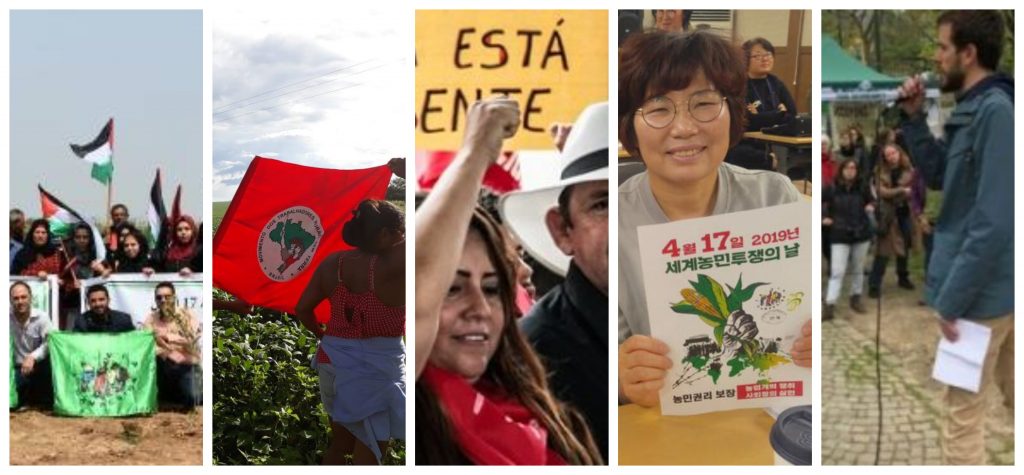
National Farmers Union in Canada issued a solidarity message and urged the Canadian government to ratify the the UN Declaration and warned against the attempts by the federal government to bring in new regulations under Canada’s Plant Breeders Rights Act that would force farmers who plant newer varieties to pay a royalty every year even when planting farm-saved seed. Union Paysanne issued a statement of solidarity and asked for the implementation of the UN Declaration. They highlighted that In Quebec and Canada, agricultural workers are often deprived of their rights, particularly the right to form unions and take collective action.
In Gazipur, Bangladesh, hundreds of farmers, farm workers, peasant women took part in a demonstration, while in Lahore Pakistan, PKRC organised a public seminar to commemorate the day. In Nepal, ANPFA publsihed a media op-ed explaining the significance of the Day.
In Indonesia, SPI organsied a public seminar titled “Promoting Human Rights in the United Nations Declaration on Peasant Rights and Other People Working in Rural Areas”. From South Korea, the Korean Peasants League and the Korean Women Peasants Association sent in messages of solidarity.
The peasants attending the Summer school on Agroecology in Kenya sent a message of solidarity stated its opposition to the proposed Food Crops Regulations 2019, which among other things requires peasants to register before farming, criminalizes growing of crops and rearing of animals at the same time and forces peasants to join associations that must registered by the County Governments.
In Mozambique, UNAC a member of Via Campesina, issued a solidarity to the victims of Cyclone Idai and urged for international attention and help to peasant families who were affected by the devastations caused. They called for the implementation of the UN Declaration and emphasised on the need to usher in agrarian reform in the country.
In Palestine, several exchange programs and events were held for peasants, pastoralists and fisherfolks in Gaza, Ramallah and Rafah. Via Campesina’s North African and Arab region issued a call for agrarian reform on the day and to break free from food dependency and assure political sovereignty to the people. In Morocco, FNSA demanded the release of political detainees of the Hirak Rif People’s Movement.
In Europe, several actions and mobilisation took place in addition to members of Via Campesina issuing solidarity statements. In a statement released by the European Coordination Via Campesina (ECVC), it emphasised that the ‘land question’ is key in the framework of peasant rights and within the struggle for Food Sovereignty. A reform of the current orientation of the CAP (European Common Agricultural Policy) becomes, in this sense, a top priority, ECVC added. A solidarity actions took place in Belgium outside the Wallon Parliament for democratising the food system.
A media interview by an LVC leader in Austria, also looked at the challenges facing the European peasants and in particular the women and youth.
Most of the activities that took place during the month are now plotted on a map that Via Campesina launched on the 17th of April.
With the worldwide onslaught of capital, one of the principal challenges is the combined struggle for land, for food that is free from poisons, and for social justice.
This means that, in order to guarantee respect for Peasants’ Rights in our territories, we need to build unity around a popular counter-offensive for regaining ground in our continent and for demanding public policies that are beneficial to us.
It is in this context that Via Campesina calls for a Popular Agrarian Reform, an agrarian reform not only for landless peasants, but for all of the working classes and for all of society.
Recommended Reading: Popular Agrarian Reform: The New Call for Agrarian Reform in the 21st Century
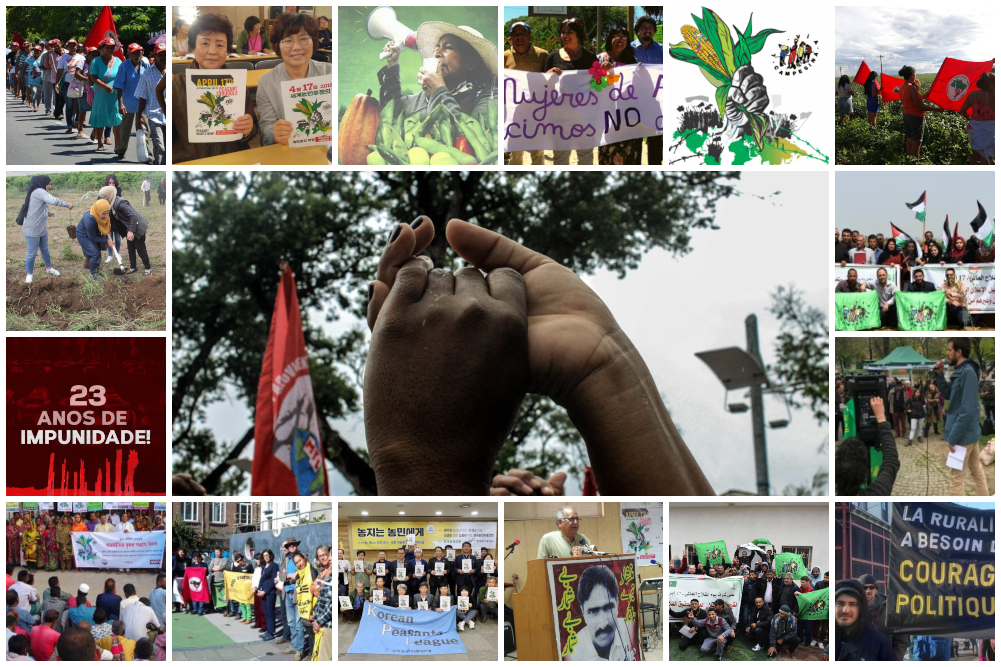
This post is also available in Español.

